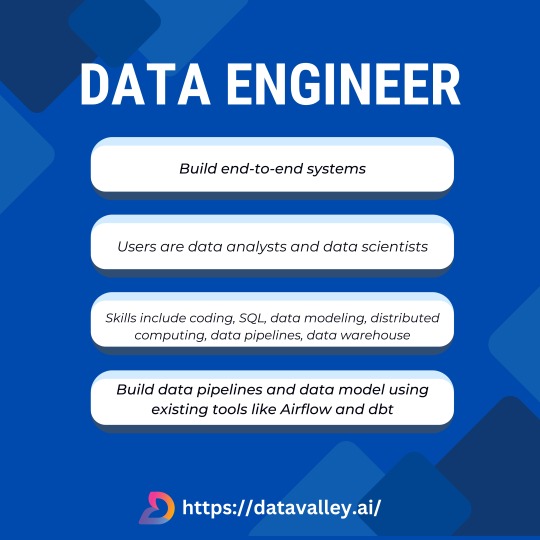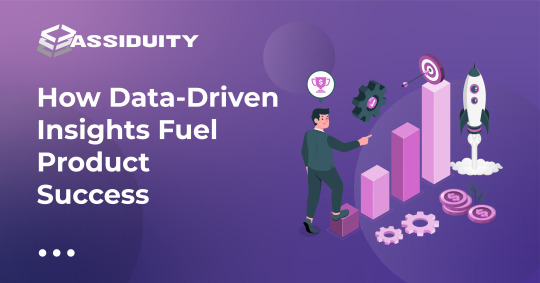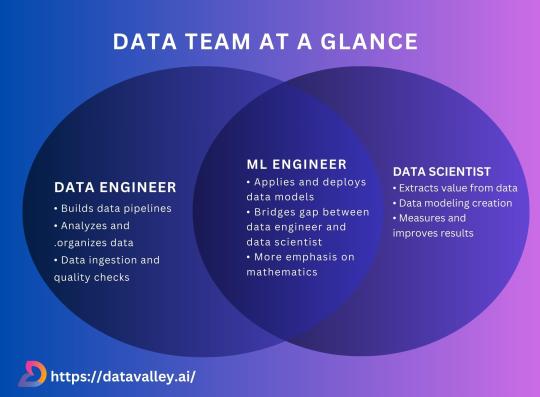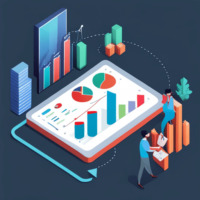#datastrategy
Text
Unleashing the Power of Data Analytics & Reporting: A Guide to Enhanced Decision-Making
In today's fast-paced business landscape, data reigns supreme. Every click, purchase, and interaction generate a wealth of valuable information waiting to be analysed and utilized. The ability to harness this data effectively through analytics and reporting can make all the difference between thriving and merely surviving in the competitive marketplace.
The Role of Data Analytics & Reporting
Data analytics involves examining raw data to draw conclusions and insights, while reporting involves presenting these findings in a structured format to facilitate decision-making. Together, they provide businesses with the necessary tools to understand customer behaviour, optimize processes, and drive strategic initiatives.
Importance of Data Analytics:
1. Informed Decision-Making: By analysing past trends and patterns, businesses can make data-driven decisions rather than relying on intuition or guesswork.
2. Competitive Advantage: Companies that leverage data analytics gain a competitive edge by identifying opportunities for growth, improving efficiency, and mitigating risks.
3. Enhanced Customer Experience: Understanding customer preferences and behavior enables personalized marketing efforts, leading to higher customer satisfaction and loyalty.
Significance of Reporting:
1. Communication of Insights: Reports serve as a means to communicate key findings, trends, and metrics to stakeholders, facilitating understanding and alignment across the organization.
2. Performance Tracking: Regular reporting allows businesses to monitor performance against goals and objectives, enabling timely adjustments and course corrections.
3. Compliance and Accountability: Reporting plays a crucial role in meeting regulatory requirements, ensuring transparency, and holding individuals and departments accountable for their actions.
Leveraging Outsourcingwise Consulting's Training for Data Analytics & Reporting
In the realm of data analytics and reporting, staying abreast of the latest tools, techniques, and best practices is essential for success. This is where Outsourcingwise Consulting's training programs come into play, offering comprehensive courses designed to equip professionals with the skills needed to excel in this field.
Cutting-Edge Curriculum:
Outsourcingwise Consulting's training curriculum covers a wide range of topics, including:
- Data Collection and Preparation: Understanding data sources, cleaning, and transforming raw data into usable formats.
- Statistical Analysis: Applying statistical methods to uncover patterns, correlations, and trends within the data.
- Data Visualization: Communicating insights effectively through charts, graphs, and dashboards.
- Reporting Tools: Utilizing industry-leading reporting tools such as Tableau, Power BI, and Google Data Studio to create compelling reports.
- Advanced Analytics Techniques: Delving into predictive analytics, machine learning, and AI for more sophisticated analysis and forecasting.
Hands-On Learning:
One of the key features of Outsourcingwise Consulting's training programs is their emphasis on practical, hands-on learning. Participants could work on real-world projects, applying their newly acquired skills to solve actual business problems. This experiential learning approach ensures that participants are not just theory-smart but also equipped with the practical know-how to tackle challenges in the workplace.
Expert Guidance:
The trainers at Outsourcingwise Consulting are seasoned professionals with extensive experience in the field of data analytics and reporting. They bring their wealth of knowledge and expertise to the training sessions, providing valuable insights, tips, and guidance to participants. Whether you're a beginner looking to build a solid foundation or an experienced professional seeking to deepen your skills, the trainers at Outsourcingwise Consulting are committed to helping you achieve your goals.
Career Advancement Opportunities:
In today's job market, proficiency in data analytics and reporting is in high demand across industries. By completing Outsourcingwise Consulting's training programs, participants not only enhance their skill set but also position themselves for career advancement opportunities. Whether it's securing a promotion within their current organization or transitioning to a new role in a different industry, the skills acquired through Outsourcingwise Consulting's training can open doors to exciting career prospects.
Conclusion
In conclusion, data analytics and reporting play a pivotal role in driving informed decision-making, enhancing organizational performance, and gaining a competitive edge in the marketplace. By leveraging Outsourcingwise Consulting's training programs, professionals can acquire the skills and knowledge needed to excel in this dynamic and rapidly evolving field. Whether you're a business leader seeking to unlock the full potential of your data or an aspiring data analyst looking to kick-start your career, Outsourcingwise Consulting offers the expertise and resources to help you succeed. Embrace the power of data analytics and reporting today, and chart a course towards a brighter, more data-driven future.
#DataAnalyticsTraining#AnalyticsEducation#DataTraining#DataScienceEducation#AnalyticsWorkshops#DataLearning#DataSkills#AnalyticsCertification#DataProfessionals#DataDrivenDecisions#AnalyticsConsulting#DataInsights#DataStrategy#BigDataTraining#DataAnalyticsBootcamp#DataVisualization#MachineLearningTraining#BusinessAnalytics#DataProficiency#AnalyticsTutorials
2 notes
·
View notes
Text

A data engineer is a professional who designs, develops, and maintains the infrastructure and systems necessary for handling large volumes of data. They specialize in constructing data pipelines, optimizing data workflows, and ensuring data quality and reliability. With expertise in programming, data modeling, and database management, data engineers play a crucial role in enabling effective data analysis and decision-making within organizations.
More Information Visit :-https://datavalley.ai/.../aws-data-engineering-masters.../
#DataTeam#DataExperts#DataAnalytics#DataDrivenDecisions#DataInsights#DataTransformers#DataMasters#DataVisualization#AnalyticsTeam#DataIntelligence#DataSolutions#DataInnovation#DataStrategy#DataLeadership#DataDrivenCulture#DataProfessionals#DataEnthusiasts#DataSkills#DataInfluencers#DataExcellence
2 notes
·
View notes
Text
Artificial intelligence business in London- Tesseract academy
Tesseract academy is a group of business experts and leaders in the field of Artificial intelligence, data science, and blockchain technology. We specialize in AI, blockchain, data science product development, and project management. Tesseract academy also offers workshops, coaching, and implementation services on related topics such as blockchain, data science managers, project management, data-driven product development, and many more.
We run Data Sciences Coaching and training programs and provide services for organizations that are either scaling up or are in the SME stage; read for more detail to go our website: https://tesseract.academy/service/
Address:
tesseract.academy,
85 Great Portland Street,
London, United Kingdom- W1W 7LT.
Contact no: 07761712921
Website: https://tesseract.academy/
#aiinbusiness#artificialintelligenceinbusines#blockchains#datasciencemanagers#datastrategy#aidatascience
2 notes
·
View notes
Text
Explore proven strategies for implementing data analytics to make informed decisions. Learn how to harness the power of data to drive success in your organization.
#DataAnalytics#DecisionMaking#BusinessIntelligence#AnalyticsStrategy#DataDrivenDecisions#DataStrategy
1 note
·
View note
Text
Crafting and Executing a Clinical Data Pipeline Strategy
Originally Published on: QuantzigCloud Data Strategy: Best Practices for Effective Implementation
Introduction: In the era of Industry 4.0, advancements in technology are reshaping productivity, efficiency, and safety within healthcare. Staying informed about these trends not only provides a competitive edge but also enhances traceability and mitigates risks. The recent COVID-19 pandemic has accelerated changes, leading to increased demand for remote support and work-from-home options. Over time, AI, machine learning, and predictive analytics have revolutionized data management and analysis.
Understanding Clinical Data Strategy: A clinical data strategy entails a standardized approach for healthcare institutions to efficiently manage and leverage their clinical data. It involves systematically collecting, storing, and analyzing healthcare data to enhance patient care, support research endeavors, and facilitate decision-making processes. Key objectives include maintaining data integrity, ensuring privacy, and reinforcing security while complying with regulatory mandates. Implementation often requires integrating electronic health record systems and utilizing data analytics technologies for streamlined data management.
Importance of Executing a Clinical Data Pipeline Strategy:
Enable Real-World Evidence-Based Line of Therapy Management: This strategy serves as a conduit for leveraging real-world evidence (RWE) to enhance line of therapy management. By collecting, integrating, and processing data from various sources such as electronic health records and wearables, the strategy ensures a consistent flow of accurate information. Clinicians and researchers can make informed decisions and adjust interventions based on real-time insights, ultimately advancing patient-centric care through evidence-based practices.
Advance Precision Medicine with a Streamlined Data Approach - Elevate Healthcare with Quantzig’s Clinical Data Pipeline. #PrecisionMedicine #DataIntegration
Enhanced Drug Efficacy: A clinical data pipeline strategy facilitates improved drug efficacy by organizing, validating, and analyzing patient data. Real-time insights aid in customizing therapies, optimizing dosages, and identifying personalized interventions. This iterative feedback loop accelerates the development of more effective medications, resulting in improved drug outcomes and patient well-being.
Revolutionize Drug Development with Quantzig’s Clinical Data Pipeline - Accelerate Insights for Enhanced Drug Effectiveness. #DrugDevelopment #DataAnalysis
Enhanced Drug Marketing Effectiveness: The strategy significantly enhances drug marketing effectiveness by orchestrating a seamless flow of patient insights. Through analyzing patient demographics, treatment outcomes, and adverse events, companies can refine messaging and tailor promotional activities to meet actual patient needs. Real-time analytics enable swift adaptation to emerging trends, fostering more personalized interactions between pharmaceutical companies and patients.
Transform Marketing Approaches with Quantzig’s Clinical Data Pipeline - Drive Personalized Interactions for Enhanced Drug Marketing Success. #PharmaMarketing #DataDrivenDecisions
Key Benefits:
Reduced Patient Dropout Rate: Research strategies play a pivotal role in reducing patient dropout rates by fostering proactive engagement and personalized interventions. Integrating data from various sources enables real-time insights into patient progress, facilitating timely interventions and personalized care adjustments.
Enhance Patient Engagement with Quantzig’s Clinical Data Pipeline - Reduce Dropout Rates with Proactive Interventions. #PatientEngagement #HealthcareEfficiency
Decreased Therapy Costs: A health data strategy offers a multifaceted approach to lowering therapy costs through data-driven optimization. By identifying cost-effective interventions and optimizing dosages, healthcare providers can prevent costly complications and streamline workflows, contributing to cost reduction.
Optimize Therapies with Quantzig’s Clinical Data Pipeline - Implement Cost-Efficient Treatment Approaches for Improved Patient Well-Being. #HealthcareCosts #TherapyOptimization
Improved Patient Mapping Across Data Sources: Effective patient journey mapping is invaluable for health systems, leading to better-informed patient outreach efforts and enhanced patient experience. A well-crafted patient journey database facilitates accurate patient identification and matching, enhancing care coordination and research endeavors.
Refine Data Integration with Quantzig’s Clinical Data Pipeline - Streamline Patient Insights for Comprehensive Care. #PatientMapping #DataIntegration
Conclusion: Crafting and executing a clinical data pipeline strategy require a harmonious blend of technology, leadership, and collaboration. By prioritizing patient outcomes, compliance, and efficiency, healthcare organizations can navigate the complex landscape of drug development and treatments, driving innovation and excellence in patient care.
Success Story: Streamlining Healthcare Insights: How Quantzig Transformed Clinical Data Pipeline Strategy Implementation
Client Details: A prominent healthcare institution faced challenges in harnessing patient data for informed decision-making and enhanced patient outcomes. They sought to implement a robust clinical data pipeline strategy to address data silos and ensure data accuracy.
Challenges: The client encountered issues with low patient mapping rates, siloed drug development planning, and poor marketing effectiveness.
Solutions: Implementation of a unified patient registry database, establishment of the OMOP schema for real-world patient data reporting, and deployment of a patient journey database infrastructure.
Impact Delivered: 50% improvement in patient and physician mapping rates, 3x faster drug adoption, and a 40% reduction in therapy costs.
Unlock Your Healthcare Data Potential with Quantzig - Transform Your Data Strategy Today.
Contact us.
0 notes
Text
Unlock Data-Driven Insights with White Box Analytics Data Consulting Services
Empower your team with interactive dashboards & high-impact reporting. End email attachments & see your data like never before. Contact White Box for data consulting service today!
0 notes
Text
Data-Driven Decision Making: Leveraging Analytics for Business Growth

In today's rapidly evolving business landscape, the ability to make informed decisions has never been more crucial. Data-driven decision-making has emerged as a powerful tool for organizations aiming to gain a competitive edge, maximize their potential, and ensure long-term success. With the vast amount of information available in the digital age, companies that harness the power of analytics can unlock a world of opportunities.
Today, this blog explores the significance of data-driven decision-making, emphasizing its transformative potential for businesses. We will delve into the ways companies can effectively utilize data to drive growth and anticipate market trends, all while keeping the focus on the key term – "Data-Driven Decision Making."
Let’s keep reading this blog post and learn more.
The Significance of Data-Driven Decision Making
Data-driven decision making is the process of using data and analytics to inform strategic choices within an organization. It is a shift away from traditional, gut-feeling-based decision making towards a more evidence-based approach. The significance of this transformation cannot be overstated, as it offers several compelling advantages for businesses.
Enhanced Accuracy: Embracing data-driven decision-making means basing choices on concrete, factual information rather than gut instincts. This shift significantly diminishes the potential for costly errors or misguided judgments. Whether it's optimizing inventory levels, pricing strategies, or marketing campaigns, relying on data-driven insights minimizes the inherent risks associated with relying solely on intuition. The ripple effect of this heightened accuracy is profound; it can manifest as increased sales, reduced operational costs, improved customer satisfaction, and ultimately, a healthier bottom line. In essence, every decision becomes a calculated step toward greater efficiency and profitability, reinforcing the pivotal role of data-driven decision-making in modern business strategies.
Improved Efficiency: Data-driven decision-making serves as a catalyst for organizational efficiency. It empowers businesses to identify inefficiencies with precision, facilitating the streamlining of processes and judicious resource allocation. The outcome is a twofold benefit – heightened productivity and substantial cost savings. By identifying bottlenecks and automating repetitive tasks through data-driven insights, companies can operate with greater agility and effectiveness. This newfound efficiency not only optimizes resource utilization but also frees up valuable time and resources for strategic endeavors, reinforcing the transformative power of data-driven decision-making in modern business operations.
Competitive Advantage: In the relentless arena of modern business, adaptability is the linchpin of success. Data-driven decision-making furnishes companies with the essential agility needed to respond rapidly to ever-evolving market dynamics, positioning them ahead of their rivals. Through real-time data analysis and predictive analytics, organizations can not only keep pace with market shifts but also proactively capitalize on emerging opportunities. This agility enables them to fine-tune strategies, refine product offerings, and provide tailored services that outshine competitors. In a landscape where staying ahead is paramount, data-driven insights are the compass that guides businesses toward a sustainable competitive advantage.
Customer-Centric Approach: Customer satisfaction is the lifeblood of any successful business. Through data analytics, companies gain a deep understanding of consumer behaviour and preferences. Armed with this knowledge, they can craft offerings that resonate with their target audience, fine-tune marketing campaigns for maximum impact, and elevate customer service to new heights. By aligning their products and services precisely with customer expectations, businesses cultivate loyalty and enhance customer retention. This not only boosts revenue but also establishes a strong brand reputation as customers become advocates, driving organic growth.
Risk Mitigation: In today's fast-paced and unpredictable business environment, risks are abundant. Data-driven decision-making acts as a protective shield, enabling organizations to identify potential risks before they escalate into crises. By meticulously examining historical data and staying vigilant to market trends, companies can make proactive, well-informed decisions that minimize exposure to adverse events. This not only safeguards their financial stability but also shields their reputation, a priceless asset in the modern era where brand perception can make or break a business. In essence, data-driven risk mitigation ensures a robust and resilient business foundation.
Innovation and Market Anticipation: Innovation is the lifeblood of progress. Data-driven insights provide a fertile ground for innovation by uncovering unmet needs and untapped markets. By studying consumer preferences and market trends, businesses can develop groundbreaking products or services that resonate with their audience. Moreover, data-driven decision-making enables companies to foresee market shifts, positioning them to adapt and innovate ahead of competitors, ensuring long-term relevance and success.
Ways Businesses Can Utilize Data for Growth and Market Anticipation
Market Research and Segmentation:
One of the foundational steps in data-driven decision making is conducting thorough market research. This involves gathering data on industry trends, customer behavior, and competitor strategies. With this information, businesses can identify market gaps and opportunities.
Segmentation is another vital aspect of market research. By dividing the target audience into distinct groups based on characteristics like age, gender, location, and preferences, companies can tailor their marketing efforts to specific customer segments. This personalized approach often yields higher conversion rates and customer satisfaction.
Customer Behavior Analysis:
Comprehending how customers engage with products or services stands as a pivotal step in fine-tuning offerings and catalyzing growth. Businesses have at their disposal a multitude of data collection channels, including website analytics, social media insights, and customer surveys.
In the realm of e-commerce, scrutinizing metrics like click-through rates, bounce rates, and conversion funnels yields invaluable insights into website performance. These metrics reveal where users are dropping off, what attracts their attention, and the conversion bottlenecks that need addressing.
For service-based companies, monitoring customer satisfaction scores and feedback becomes the linchpin for identifying areas ripe for improvement. These inputs provide a compass for enhancing service quality, streamlining processes, and ensuring that the customer experience remains at the forefront of the business strategy. This data-driven approach paves the way for not only immediate improvements but also long-term sustainable growth.
Predictive Analytics:
Predictive analytics leverages historical data to forecast future trends and outcomes. By applying advanced algorithms to large datasets, businesses can make more accurate predictions regarding customer behavior, demand fluctuations, and sales trends.
For example, a retail company can use predictive analytics to anticipate which products will be in high demand during specific seasons, ensuring they have adequate inventory on hand. Similarly, a subscription-based service can use predictive analytics to identify customers at risk of churn and take proactive measures to retain them.
Supply Chain Optimization:
Efficient supply chain management is crucial for businesses in various industries. Data-driven decision making can enhance supply chain operations by optimizing inventory management, reducing lead times, and minimizing transportation costs.
For instance, logistics companies can use data analytics to identify the most cost-effective shipping routes and modes of transportation. Manufacturers can monitor equipment performance in real-time to predict maintenance needs, minimizing downtime and production delays.
Personalized Marketing:
Personalization has evolved into a cornerstone of contemporary marketing strategies, and data-driven decision making is the key that unlocks its full potential. It equips businesses with the ability to craft highly tailored marketing campaigns that deeply resonate with individual customers. Through the analysis of rich customer data, encompassing elements like browsing history, purchase behavior, and preferences, companies can create personalized messaging and offers that feel uniquely relevant.
Whether through personalized emails addressing specific interests, product recommendations based on past behaviors, or retargeting ads that gently remind customers of their preferences, data-driven personalization significantly boosts engagement and conversion rates. It establishes a more profound connection between the brand and the consumer, fostering loyalty and increasing the likelihood of repeat purchases, ultimately driving business growth in an era where one-size-fits-all marketing approaches fall short.
Also read our article: Is Sustainability a Competitive Advantage
Fraud Detection and Risk Management:
Data analytics plays a crucial role in fraud detection and risk management. Financial institutions, for instance, use machine learning algorithms to detect suspicious transactions and identify potential cases of fraud.
Additionally, insurance companies utilize data-driven models to assess risk profiles accurately, allowing them to set appropriate premiums and coverage levels. By mitigating fraud and managing risks effectively, businesses can protect their financial health and reputation.
Also Read: Financial Management Tips for Small Businesses
Product Development and Innovation:
Innovation is the heartbeat of enduring business growth, and data-driven decision making has emerged as a pivotal driver of this innovation. It serves as a guiding light for product development, helping businesses identify customer preferences and unmet needs with unparalleled precision. By actively collecting and meticulously analyzing customer feedback, reviews, and surveys, companies gain invaluable insights into areas where their products or services can be enhanced.
This feedback loop becomes the catalyst for innovation, igniting the creation of new and improved offerings that align closely with customer expectations. The result is a continuous cycle of innovation that not only keeps businesses competitive but also strengthens customer loyalty, fostering sustained growth and relevance in an ever-evolving marketplace.
NOTE:
In the ever-evolving landscape of business, the significance of data-driven decision making cannot be overstated. The ability to harness and interpret vast amounts of data has become a cornerstone for achieving sustainable growth and maintaining a competitive edge. Econstra, a leading business consultancy in India, stands out as a beacon for organizations seeking to navigate this data-driven paradigm. With a proven track record of leveraging analytics for informed decision making, Econstra has consistently propelled businesses towards unprecedented growth. Their team of seasoned professionals combines industry expertise with cutting-edge analytics tools, offering tailored solutions that empower clients to make strategic decisions based on concrete insights. As a trailblazer in the realm of business consultancy, Econstra's commitment to excellence and innovation makes them a trusted partner for enterprises aspiring to transform data into a powerful driver of success. Choose Econstra and embark on a journey towards business growth fueled by data-driven insights.
Conclusion
In conclusion, data-driven decision making is a game-changer for businesses seeking growth and market anticipation. By embracing the power of data and analytics, companies can enhance accuracy, efficiency, and competitiveness. The significance of data-driven decision making lies in its ability to drive innovation, reduce risks, and create a customer-centric approach that resonates with modern consumers.
To succeed in today's dynamic business environment, organizations must continually adapt and evolve. Data-driven decision making provides the tools necessary to make informed choices, anticipate market trends, and stay ahead of the competition. As businesses continue to collect and analyse data, the opportunities for growth and optimization are virtually limitless. So, it is time for companies to recognize the transformative potential of data-driven decision making and make it an integral part of their strategic planning processes.
By harnessing the power of data, businesses can chart a course toward sustained success in an ever-changing world.
#DataDrivenDecisionMaking#AnalyticsForBusiness#BusinessGrowth#DataAnalytics#BusinessIntelligence#DataInsights#StrategicDecisionMaking#BusinessAnalytics#DataDrivenInsights#ConsultancyServices#BusinessConsulting#DataStrategy#DecisionScience#DataDrivenBusiness#ConsultingExcellence#AnalyticsStrategy#BusinessTransformation#DecisionSupport#ConsultingSolutions#InnovationInAnalytics#CorporateStrategy#ConsultingFirm#DataInnovation#BusinessOptimization#ConsultingExperts
0 notes
Text

Meet the minds driving retail innovation! AppTad is thrilled to announce our experts - Amit Dubey, Arbind Singh, Robert Long & Abhijit Thakur presence at NRF'24. Get ready to connect with industry visionaries, explore cutting-edge strategies, and dive deep into retail's future. Don't miss this chance to meet our executives and gain invaluable insights! See you at NRF'24!
Schedule your personal tour today: https://calendly.com/the-robert-long/nrf-guided-tour
#Apptad#NRF2024#GenAI#MasterDataManagement#RetailInnovation#DataStrategy#DataManagement#ExecutivePresence
0 notes
Text
The GA4 Migration Dilemma: What Happens If You Don't Make the Move?
Curious about the latest in analytics? Our recent blog post dives into the world of Google Analytics 4 (GA4) and what might unfold if you don't migrate. Check it out here: What Will Happen If I Don't Migrate to GA4?
Insights You Need:
Evolution of Analytics: Explore the changes GA4 brings and why it's considered the future of Google Analytics.
Data Continuity Challenges: Understand the potential issues with sticking to the older version and how it may impact your data continuity.
Unlocking Advanced Features: Discover the enhanced capabilities and features GA4 offers, giving you a competitive edge.
Future-Proof Your Analytics: Learn why making the move to GA4 is not just a necessity but a strategic decision for the future.
Migration Roadmap: Get insights into the steps for a smooth transition and how to make the most out of GA4.
Ready to stay ahead in the analytics game? Dive into the details and ensure your data strategy is future-proof!
0 notes
Text

For cutting-edge AI solutions, turn to Inference Labs, the best AI company in India. Our expertise is your key to staying competitive in today's AI-driven world
#InferenceLabs#DataAnalytics#BigData#MachineLearning#ArtificialIntelligence#DataInsights#AnalyticsSolutions#DataDriven#AdvancedAnalytics#BusinessIntelligence#PredictiveAnalytics#DataScience#AIandML#DataInnovation#AnalyticsExperts#DataVisualization#DataStrategy#DataMining#DataAnalyticsConsulting#AnalyticsTools#DataEngineering#AIAnalytics#DigitalTransformation#BusinessData#DataAnalyticsServices#DataAnalysis#DecisionSupport#DataManagement#InsightfulData#DataDrivenDecisions
0 notes
Text

In today's data-rich landscape, the success of a product often hinges on the ability to harness and interpret data-driven insights. These insights are more than just numbers; they're windows into customer behavior, market trends, and the performance of your product in real-world scenarios. By adopting a data-driven approach, businesses gain a competitive edge by making informed decisions that resonate with their target audience.
#DataDrivenInsights#ProductSuccess#CustomerAnalytics#BusinessIntelligence#DataAnalysis#MarketResearch#ProductDevelopment#DataStrategy#Innovation#DataDrivenDecisions#CustomerBehavior#MarketInsights#ProductStrategy#DataAnalytics#BusinessStrategy#DigitalTransformation#DataScience#CustomerExperience#ProductPerformance#DataInnovation
0 notes
Text
How does implementing data governance impact an organization's ability to find and utilize critical data?
Implementing data governance can have a significant impact on an organization's ability to find and utilize critical data effectively. Data governance refers to the overall management of data assets within an organization, including data quality, data integrity, data security, and data management processes. Here's how data governance can influence an organization's ability to find and utilize critical data:

Data Discovery and Documentation: Data governance initiatives often involve creating and maintaining a comprehensive inventory of the organization's data assets. This includes documenting where critical data resides, who owns it, how it's collected, processed, and used. Such documentation makes it easier for employees to locate and understand the data they need, enhancing the organization's ability to find critical data.
Data Quality and Consistency: Data governance emphasizes data quality standards and practices. By ensuring that critical data is accurate, consistent, and up-to-date, the organization can trust the information it retrieves. Improved data quality reduces the likelihood of errors or misinterpretations when utilizing critical data.
Access Control and Security: Data governance includes defining access controls and security measures for data. This helps protect critical data from unauthorized access, ensuring that only authorized personnel can utilize it. This controlled access prevents data misuse and maintains data integrity.
Data Classification and Categorization: As part of data governance, data assets are often classified based on sensitivity and criticality. This classification helps prioritize resources for securing and managing critical data appropriately. It also aids in quickly identifying which data is essential for specific purposes.
Data Lifecycle Management: Data governance involves establishing processes for data lifecycle management, including data creation, storage, usage, archiving, and deletion. Understanding the lifecycle of critical data ensures that it is retained only as long as needed and disposed of securely when no longer required, thus reducing clutter and potential confusion.
Data Ownership and Accountability: Assigning data ownership and establishing clear accountability for data assets encourages responsible data usage. When individuals or teams are accountable for specific data sets, they are more likely to maintain and utilize the data correctly.
Data Standardization: Data governance often includes standardizing data formats, naming conventions, and data definitions. This makes it easier for employees to recognize and work with critical data consistently, promoting better data utilization across the organization.
Data Integration and Interoperability: By implementing data governance practices, organizations can facilitate better integration and interoperability between different systems and departments. This enhances the ability to combine and analyze critical data from various sources, enabling more informed decision-making.
Data Retention Policies: Data governance defines retention policies that determine how long data should be retained. Applying these policies to critical data ensures that it remains available and usable for the required duration, avoiding premature deletion or excessive storage costs.
Compliance and Regulatory Requirements: Data governance helps organizations comply with industry regulations (such as GDPR, HIPAA, etc.) by ensuring that critical data is handled according to legal requirements. This compliance enables organizations to avoid penalties and legal issues while utilizing their data effectively.

In summary, implementing data governance establishes a structured framework for managing data assets. This framework enhances an organization's ability to locate, access, and utilize critical data by improving data quality, security, documentation, and overall data management practices. As a result, organizations can make more informed decisions and derive greater value from their data assets.
#DataGovernance#DataManagement#DataQuality#DataIntegrity#DataPrivacy#DataSecurity#Compliance#DataStewardship#DataStrategy#DataAnalytics#DigitalTransformation#BusinessIntelligence#DataDriven#InformationGovernance#DataProtection#DataEthics#RegulatoryCompliance
1 note
·
View note
Text

DATA TEAM AT A GLANCE "data team is a dynamic group of experts dedicated to extracting insights from complex data. With a diverse skill set encompassing data engineering, analytics, and visualization, we tackle data challenges head-on. Leveraging advanced tools and technologies, we transform raw data into actionable intelligence, empowering informed decision-making and driving organizational growth. "
More information visit :-https://datavalley.ai/category/data-engineering/
#DataTeam#DataExperts#DataAnalytics#DataDrivenDecisions#DataInsights#DataTransformers#DataMasters#DataVisualization#AnalyticsTeam#DataIntelligence#DataSolutions#DataInnovation#DataStrategy#DataLeadership#DataDrivenCulture#DataProfessionals#DataEnthusiasts#DataSkills#DataInfluencers#DataExcellence
2 notes
·
View notes
Text
Top 5 Reasons to Hire an Information Consulting Company

In the ever-evolving digital age, businesses are inundated with data and information, making effective management and utilization of these resources a crucial aspect of success. To navigate this information-rich landscape and extract valuable insights, many companies are turning to information consulting companies for expert guidance. Here are five compelling reasons why you should consider hiring an information consulting company:
1. Expertise and Specialized Knowledge: Information consulting companies are equipped with a team of experienced professionals who possess specialized knowledge in data management, analytics, and information technology. Their expertise spans various industries and domains, allowing them to offer tailored solutions that address your specific challenges. By hiring experts, you gain access to a deep well of knowledge that can lead to more informed decisions and strategic planning.
2. Data-driven Decision Making: In today's data-driven world, making informed decisions is paramount. Information consulting companies have the tools and methodologies to collect, analyze, and interpret data, providing you with actionable insights. These insights enable you to make decisions based on accurate information rather than intuition, resulting in better outcomes and a competitive edge.
3. Improved Efficiency and Productivity: Effective information management can significantly enhance your company's efficiency and productivity. Information consulting companies can streamline your data processes, automate repetitive tasks, and implement efficient data management systems. This optimization frees up valuable time and resources, allowing your team to focus on core business activities and innovation.
4. Stay Ahead of Technological Trends: The technology landscape is constantly evolving, with new tools and solutions emerging regularly. An information consulting company stays up-to-date with the latest technological trends and advancements. By partnering with them, you can harness the power of cutting-edge technologies, ensuring that your data management strategies remain relevant and effective in an ever-changing environment.
5. Customized Solutions for Your Needs: Every business has unique challenges and goals when it comes to information management. Information consulting companies recognize this and offer customized solutions tailored to your specific requirements. They assess your current processes, identify pain points, and design strategies that align with your objectives. This tailored approach ensures that you get the most value out of their services.
In conclusion, hiring an information consulting company provides your business with access to expertise, data-driven insights, improved efficiency, technological innovation, and customized solutions. In a world where information is a valuable asset, partnering with professionals who understand how to manage and leverage it effectively can propel your business to new heights of success. Whether you're looking to optimize data processes, implement analytics solutions, or enhance decision-making, an information consulting company in Chattanooga can be a strategic partner on your journey to excellence.
#InformationConsulting#DataInsights#BusinessAnalytics#DataDrivenDecisions#ExpertConsultants#InformationManagement#TechAdvancements#StrategicPlanning#EfficiencyBoost#CustomizedSolutions#InnovationPartner#DigitalTransformation#TechSavvy#DataStrategy#DecisionSupport#IndustryExperts#DataOptimization#BusinessIntelligence#FutureReady#CompetitiveEdge
0 notes
Text
Metadata: 100 Guide to Understanding and Leveraging Data About Data

In this age of digitization, data has taken the place of gold. However, the component known as metadata is what gives this gold its actual value. This article will take you through the exciting world of metadata, illuminating its meaning, various types, examples, purpose, and other information.

Metadata
Metadata is a phrase that frequently comes up in conversations about big data, data management, and data science. And what exactly makes it so vital? This tutorial aims to provide an in-depth review of metadata and its function in the contemporary data landscape, to answer the issues posed here and others.
What Exactly Does It Mean to Have Metadata?
Metadata, sometimes known as 'data about data,' is information that either describes, locates, or in some other way makes it simpler to obtain, utilize, or manage data.
Metadata is a collection of data that, in addition to providing information about other data, also characterizes that data. A digital image may, for instance, contain metadata that portrays the picture in terms of its size, color depth, image resolution, when it was made, and a variety of other data. The metadata associated with a text document may include information such as the document's length, the author's name, the date the document was created, and a concise description of the document's content.
An Analysis of the Development of Metadata from a Historical Standpoint
The idea of metadata has been around for quite some time. It dates back to the beginning of structured collections of knowledge and has been around ever since. Metadata has always been essential to the rapid and easy retrieval of information, whether in the form of library card catalogs or the digital tags used on contemporary websites.
In the past, metadata was mainly utilized in libraries and archives to catalog papers and other items and retrieve them when needed. The usage of metadata has become substantially more widespread with the introduction of the internet and other forms of digital technology. Nowadays, metadata is utilized in various sectors, including digital libraries and databases, websites, and social media platforms, to name just a few examples.
The Importance of Metadata in Today's World and the Functions It Serves
Metadata is vital in the data-driven society that we live in today. It is helpful for various data-related tasks, including data management, data integration, data mining, and data governance. The metadata is responsible for making the data understandable and usable.
Metadata has a wide range of applications in the area of digital computing. Metadata is used by search engines so that they can comprehend the content of web pages and produce more accurate results. Metadata is the information digital cameras store regarding capturing a photograph. Social media networks use metadata to organize and classify postings.
What Kinds of Things Might Be Considered Metadata?
There is metadata in everything. The information, such as the date, time, location, and even the camera settings, are saved as metadata whenever you snap a picture with your smartphone. Examples of metadata include the artist's name, the song title, the album name, and the genre of a music file.
In Everyday Life: Examples of Common Uses for Metadata
Metadata is an essential component of everything we encounter in our lives, from the books in a library to the posts on social networking websites. It enables us to locate, organize, and comprehend information rapidly and effectively.
For instance, when you use a search engine to locate material online, you use metadata. The search engine analyzes metadata to comprehend the content of web pages and return results pertinent to the query. When you take a picture with your digital camera, the camera records information about the image. This metadata includes the date and time the photo was taken, the camera settings, and if your camera has a GPS feature, the picture's location. This metadata may be utilized later to categorize your photographs, locate specific graphics, or even understand the conditions when the image was shot.

The Role Of Metadata In The Online World
The Role of Metadata in the Online World: Illustrations from the Tech Sector
In the realm of information technology, metadata may serve many purposes. Websites, for instance, will often include metadata in meta tags to convey the page's subject matter to search engines. Databases employ metadata to give a roadmap to their material.
Metadata describes other information; for instance, the structure of a database, the types of data kept in the database, and how the data is arranged may all be described using metadata. It is possible to utilize this information to understand the structure of the database, compose queries that will obtain data from the database, and manage the data stored in the database.
Which Three Different Types of Metadata Are Correct?
It is possible to divide metadata into three distinct types: descriptive, structural, and administrative.
The Secret to Discoverability Lies Within Descriptive Metadata
Metadata that is descriptive contains things like the title, abstract, author, and keywords, all of which contribute to the process of locating and identifying data. The purpose of this kind of metadata is to give information that can assist in finding and distinguishing the data. For instance, a book's title, author, and keywords are all examples of descriptive information that might help you locate the book in a physical location such as a bookshop or library.
The blueprint for data organization is known as structural metadata.
The organization, structure, and kinds of data can be better understood with the help of structural metadata. It is a way of describing the arrangement of the individual parts of a dataset or item. For the sake of illustration, structural metadata for a book might include details such as the sequence in which the chapters are presented, the total number of pages, and the connection between the branches and the book.
Administrative metadata is known as the keeper and protector of data rights.
Administrative metadata may be used to administer a resource, such as the date and method of creation, the kind of file and any other relevant technical information, and the users authorized to use the help. The management and administration of data make use of this kind of metadata. An example of administrative metadata for a digital image may include:
The image's creation date.
The program used to make the image.
The rights and permissions are connected with the idea.
What is the Most Important Role That Metadata Plays?
The primary function of metadata is to make it easier to find important information, to make data administration more efficient, and to safeguard information so that it may be preserved.
Improving the Capability to Discover Data: The Part Played by Metadata
Metadata improves the discoverability of data by giving helpful information about the material. It assists users in locating the pertinent facts at the appropriate moment. When you use a search engine, for instance, to obtain information on the internet, the search engine uses metadata to interpret the content of web pages and offer search results relevant to your query.
Facilitating Data Management: How Metadata Contributes
By giving a context for the data that has been saved, metadata makes data administration much more effortless. It assists in integrating data, ensuring data quality, maintaining data stewardship, and managing data operations. For instance, metadata may be utilized in a database to understand the structure of the database, compose queries for retrieving data, and collect the data kept inside the database.

The Value Of Metadata In Protecting Users' Personal Information And Private Data
The Value of Metadata in Protecting Users' Personal Information and Private Data
Metadata is essential in protecting users' privacy and keeping their data secure. It explains who can access the data, where it should be housed, and how it should be safeguarded from unauthorized access. For instance, administrative metadata could contain information about the rights and permissions associated with a specific piece of data. This kind of information can control who has access to the data and what they are allowed to do with it by holding who has access to the data and what they are allowed to do with it.
The Value of Metadata in many Different Fields
Metadata is not only an idea; instead, it is a potent instrument that drives insights and choices across a variety of areas.
In data science, metadata is the engine that drives insights and predictions.
In data science, metadata is information about data that helps researchers understand the data better. It facilitates data analysis, data visualization, and data mining. In a dataset, metadata can offer information about the variables, their kinds, and their relationships. This information can be found in a dataset, which can be used to pick the proper analytic techniques and accurately interpret the findings.
Informing Strategic Decisions Through the Use of Metadata in Business Intelligence
In the realm of business intelligence, metadata is what supplies the context, which in turn enables more informed and effective strategic decision-making. It helps integrate data, manage data warehouses, and do data analytics. In a business intelligence system, for instance, metadata may be utilized to understand the structure of the data warehouse, compose queries to obtain data for use in reports and dashboards, and correctly interpret the results of those searches.
The role of metadata in data warehousing is to simplify storing and retrieving data.
Metadata is utilized in data warehousing to facilitate effective data organization, location, and retrieval. It enables data storage, data transfer, and data lifecycle management. For instance, in a data warehouse, metadata may be used to understand the structure of the warehouse, the types of data that are kept in the warehouse, and how the data is arranged. This understanding can then be used to effectively manage the data stored in the warehouse and efficiently retrieve data.
The Problems and the Answers in the Field of Metadata Management
Metadata is helpful, but keeping track of it has its own unique set of issues. Nevertheless, one can triumph over these obstacles by employing the appropriate tactics and resources.
The Most Frequently Encountered Problems in Metadata Management and How to Fix Them
Problems with data quality, a lack of standards, and worries about data security are some of the more prevalent obstacles associated with managing metadata. The implementation of data quality measures, the adoption of metadata standards, and the enforcement of data security regulations are all potential solutions.
Implementing data quality procedures such as data validation, cleansing, and auditing solves data quality problems.
Adopting metadata standards that establish criteria for the generation, usage, and administration of information can solve the problem of a need for more standardization. Concerns about data safety can be alleviated by implementing data security rules that restrict access to metadata, shield it from illegal access and change, and protect it from exposure to potential threats.
Guidelines for Efficient and Effective Management of Metadata
Implementing best practices for metadata management, such as setting explicit metadata policies, utilizing tools for metadata management, and routinely updating and evaluating metadata, is necessary to manage metadata effectively.
It is possible to guarantee that metadata is generated, utilized, and maintained in a manner that is consistent and successful by defining explicit metadata policies and putting them into place. Using metadata management solutions may assist in automating the process of creating, utilizing, and managing metadata, making the process more time-effective and less prone to mistakes. By evaluating and updating it regularly, it is possible to guarantee that metadata will continue to be accurate, relevant, and valuable. Trends and Forecasts Regarding the Development of Metadata: As we progress toward a future driven more and more by data, the metadata function will become even more critical.
Emerging Trends in Metadata Management
The use of artificial intelligence and machine learning in metadata production and administration is one example of an emerging trend in metadata management. Other examples include the rising relevance of metadata in data governance and the rise of metadata in the era of big data and the Internet of Things.
It is possible to employ AI and machine learning to automate the metadata production and administration process, resulting in increased productivity and precision. Metadata is gaining more attention due to the rising significance of data governance since it offers the context and understanding necessary to regulate data successfully. The advent of big data and the Internet of Things is leading to an explosion in the quantity of metadata since every piece of data created by these technologies comes with its own information set. This explosion in the amount of metadata is leading to an explosion in the number of data.
The Prospects for Metadata Soon: Predictions and Anticipations
The future of metadata has a lot of potential.
The value of metadata in data management and the decision-making process is expected to expand exponentially due to technological developments and increased awareness of the significance of data. The need for efficient metadata management will only grow as we continue to produce and consume more data in the future.
Summary: The Crucial Part That Metadata Plays in Today's Data-Driven World
In a world driven by data, metadata is an instrument that cannot be ignored. It gives the data context, making it more intelligible and valuable. Metadata is essential in all aspects of data science, business intelligence, and data warehousing, playing a necessary part in generating insights, forming choices, and optimizing business processes. Because the significance of metadata is expected to increase as we go closer to the future, it is a subject that is well worth investigating and becoming knowledgeable about.
Metadata is more than just 'data about data.'
It is the essential element that enables data to realize its full potential. By giving context, metadata makes data relevant and valuable. It allows us to locate the appropriate data at the right moment, comprehend the data we already have, and make educated decisions based on our data.
Metadata is becoming more significant in big data, characterized by an unprecedented increase in data amount, variety, and velocity. The metadata assists us in navigating the immense ocean of data, locating the information we require, and making efficient use of it.
The need for efficient metadata management will only grow as we continue to produce and consume more data in the future. The difficulties associated with managing metadata are accurate, but they can be surmounted with the appropriate approaches and technologies. We can guarantee our metadata's precision, use, and relevance if we implement the most effective procedures for managing metadata.
The outlook for metadata in the future is quite positive. The value of metadata in data management and the decision-making process is expected to expand exponentially due to technological developments and increased awareness of the significance of data. Understanding the power of metadata and using it effectively will be essential to our progress as we move toward a future that data will drive.
Read the full article
#BusinessIntelligence#DataAnalysis#DataCompliance#DataGovernance#DataInfrastructure#DataIntegration#DataLifecycle#DataManagement#DataMigration#DataMining#DataOperations#DataPrivacy#DataProcessing#DataQuality#DataScience#DataSecurity#DataStandards#DataStewardship#DataStorage#DataStrategy#DataSystems#DataTransformation#DataVisualization#DataWarehousing#Metadata
0 notes
Text
How Data Science is Revolutionizing Business
As organizations create more and more data, the ability to use this information to gain a competitive edge is becoming increasingly vital. That's where data science comes in: the application of statistical and computational tools to extract insights from huge and complicated data sets. In this post, we'll look at how data science is transforming business and present instances of how firms are utilizing data science to get insights into consumer behavior, optimize processes, and enhance decision-making.
Customer Insights: Gaining deep insights into customer behavior is one of the most important benefits of data science for companies. Companies may better understand their consumers and customize their marketing and sales tactics by analyzing customer data such as purchase history, online behavior, and demographic information. A store, for example, may use data science to analyze client purchasing habits and then provide targeted discounts or promotions based on those trends.
Operations Optimization: Another area where data science may have a significant influence is in operations optimization. Companies can uncover inefficiencies and areas for development by analyzing data from manufacturing processes, supply networks, and logistics. For example, a company may utilize data science to analyze production line data and identify bottlenecks or other issues that are impeding output.
Decision-Making: Finally, data science can assist firms in making better decisions by giving insights and forecasts based on data analysis. A financial organization, for example, may utilize data science to analyze market patterns and make investment decisions based on such trends. Similarly, a store may utilize data science to forecast future sales volumes and optimize inventory levels accordingly.
Data science also presents obstacles, such as data quality and privacy concerns. However, as businesses create more data, the ability to extract insights and achieve a competitive edge will only grow more crucial. As a result, firms that embrace data science are more likely to prosper in the long run.
Finally, data science is transforming business by offering deep insights into consumer behavior, optimizing processes, and enhancing decision-making. Businesses may acquire a competitive edge and remain ahead of the curve by embracing the power of data. As a result, data science is becoming a more vital tool for companies of all sizes and sectors.
Are you ready to join the data science revolution and take your business to the next level? Join our comprehensive data science training program at http://cacms.in/data-science/ to get the skills and expertise you need to leverage the power of data and drive innovation in your organisation. Start your journey to success today!
#CACMS#DataScience#BusinessIntelligence#BigData#AI#MachineLearning#DataAnalytics#BusinessTransformation#DigitalTransformation#DataDriven#PredictiveAnalytics#DataMining#DataVisualization#BusinessInsights#DataEngineering#DataStrategy#DataInnovation#BusinessStrategy#DataTechnology#DataManagement
0 notes